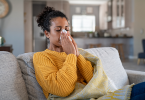Just like anything in life, sun exposure is a bit of a mixed bag.
We all know that too much time spent absorbing those UVA and UVB rays can lead to damaged skin, which in time can result in skin cancer – a major reason to apply the sunscreen and protect our skin from the sun as much as we can.
At the same time, a little sun can be a good thing, added Dr. Jacqueline DuBose, a family medicine physician at Augusta University Family Medicine. “Moderation is key,” she said.
So want to have your day in the sun? Here’s the good, the bad and the ugly.
The good
One of the best things that sun exposure does for our bodies is help us produce vitamin D. This vitamin is found in a limited number of food sources – with fatty fish or fortified foods like milk among the most common. But you don’t need a lot of sun: Just 10 to 15 minutes of sun exposure about four times a week on your sunscreen-free face, arms, legs or back is enough to get you your daily requirement of vitamin D. This is about 600 IU (international units), or 1,000 milligrams when measured in supplements.
The vitamin plays a vital role in helping us feel good, literally: Meeting your daily requirement of vitamin D has been found to help stave off depression. The vitamin is also necessary for strong bones, since it helps our bodies absorb calcium. And in a crazy way, sun exposure – with the resulting dose of vitamin D – has also been linked to cardiovascular health: A 2013 Danish review of 4,000 patient cases found that those who had been diagnosed with skin cancer were less likely to have had a heart attack.
When it comes to better sleep, natural light appears to play a major role in preventing insomnia. If you work indoors all day and rarely leave for lunch, it could be that your circadian rhythms – which tell you when to wake up and when to go to sleep – may be off, leaving you wide awake at 2 a.m. But there’s possibly an easy fix: Just going outdoors for about 30 to 60 minutes a day can help you get back on track.
The bad
If you’re protecting your skin from the sun, you don’t want to forget about sunglasses with protective UVA/UVB coating. Over time, sun exposure can lead to cataracts, macular degeneration, glaucoma and other potentially blinding disorders. It’s not fun to think about when you’re in your 20s, but you’ll be grateful for your devotion to fashionable sunglasses once you hit your 50s or 60s.
Sunshine and outside air can mix up a not-so-great cocktail of smog that’s also not so good for your lungs. UV rays actually trigger polluted air to release smog-forming chemicals, according to a study presented at the American Chemical Society’s 2015 annual meeting. This kind of pollution can lead to asthma and even a higher risk of stroke and heart disease.
And if you often experience headaches after being outdoors, cue the sun once again. Bright light is a common migraine trigger. But also consider if you’re dehydrated. Too much sun can lead to dehydration and heat exhaustion, and headaches are a common early symptom.
The ugly
That wrinkle you see today? That’s not just aging, folks. It’s sun exposure.
In fact, a Yale University study found that much of the damage to skin following sun exposure happens hours later, even if you go inside or even if you sit in the dark.
… which brings us back to the sunscreen.
“Natural light is part of our daily lives, and we know that it’s necessary for a number of body functions,” Dr. DuBose said. “But overdoing sunlight – like many things in life – negates those positives. So wear sunscreen daily, along with sunglasses and a hat if you plan to be outdoors for an extended period of time, seek the shade when possible, hydrate, and try to avoid being outdoors during the hours of 10 a.m. and 2 p.m. when the sun’s rays are the strongest.”
Your skin will thank you – while the rest of your body can still reap the benefits.
Get real, and protect yourself.
To find a doctor or schedule an appointment at Augusta University Health, visit augustahealth.org, or call 706-721-2273 (CARE).





